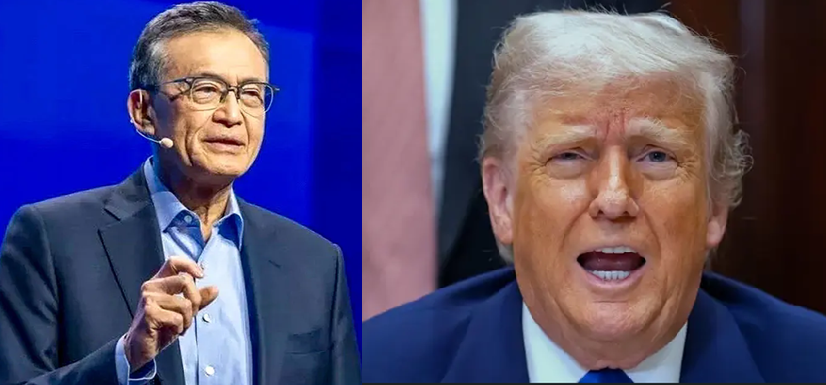
Trump calls for Intel CEO’s resignation over China ties, citing national security risks
No Other Solution – In a dramatic escalation of tech-sector scrutiny, U.S. President Donald Trump has publicly called for the resignation of Intel CEO Lip-Bu Tan, citing alleged conflicts of interest due to Tan’s extensive ties to Chinese technology firms. The demand, delivered via Truth Social, has sent shockwaves through Silicon Valley, Capitol Hill, and global markets, raising urgent questions about national security, corporate governance, and the future of U.S.-China tech relations.
Table of Contents
“The CEO of INTEL is highly CONFLICTED and must resign, immediately. There is no other solution to this problem,” Trump posted on August 7.
Tan, who took the helm of Intel in March 2025, is now at the center of a political firestorm that could reshape the semiconductor industry and redefine the boundaries between private enterprise and national interest.
The Allegations: Ties to China’s Military-Linked Firms
The controversy stems from revelations that Lip-Bu Tan, a veteran of the semiconductor and venture capital industries, has invested – both personally and through his firm Walden Catalyst Ventures – in hundreds of Chinese companies. According to a Reuters investigation, at least eight of these firms have direct ties to the Chinese People’s Liberation Army (PLA).
Senator Tom Cotton (R-Ark.), a leading voice on national security, amplified these concerns in a letter to Intel’s board chairman, Frank Yeary. Cotton accused Tan of being “deeply entangled” with Chinese military-linked entities and questioned Intel’s ability to responsibly manage billions in U.S. government funding under the CHIPS and Science Act.
“Mr. Tan reportedly controls dozens of Chinese companies and has a stake in hundreds of Chinese advanced-manufacturing and chip firms,” Cotton wrote.
The senator also referenced Tan’s previous role as CEO of Cadence Design Systems, which recently pleaded guilty to illegally exporting semiconductor design tools to China’s National University of Defense Technology – a military-affiliated institution. The company paid over $140 million in criminal penalties.
Market Fallout and Intel’s Response
Trump’s call for resignation had immediate financial repercussions. Intel’s stock dropped more than 3% in after-hours trading, reflecting investor anxiety over leadership instability and potential regulatory backlash.
In response, Intel issued a statement defending Tan and reaffirming its commitment to U.S. national security:
“Intel, the Board of Directors, and Lip-Bu Tan are deeply committed to advancing U.S. national and economic security interests and are making significant investments aligned with the President’s America First agenda,” the company said.
Tan himself has not publicly addressed the resignation demand but has previously stated that Intel is working closely with the U.S. administration to ensure transparency and compliance.
Still, the damage may already be done. Analysts warn that the controversy could complicate Intel’s turnaround strategy, which includes massive layoffs, restructuring, and a pivot toward AI and mobile chip markets—areas where rivals like Nvidia have surged ahead.
Trump’s Broader Strategy: Tech, Trade, and Nationalism
Trump’s demand is not an isolated incident – it fits squarely within his broader “America First” economic and security agenda. In recent weeks, he has imposed sweeping tariffs on dozens of countries, criticized tech firms for outsourcing, and praised Apple for committing $100 billion to U.S. operations.
“Intel was just taken to the cleaners,” Trump said during a joint announcement with Apple CEO Tim Cook.
By targeting Intel, Trump is sending a message to corporate America: ties to China – especially in sensitive sectors like semiconductors—will not be tolerated. The former president’s rhetoric also reflects growing bipartisan concern over Chinese cyber espionage, supply chain vulnerabilities, and the strategic importance of chip manufacturing.
Senator Cotton has gone further, urging the Department of Defense to ban non-U.S. citizens from accessing sensitive networks and calling for investigations into Chinese nationals working at defense contractors.
“China’s cyber capabilities pose one of the most aggressive and dangerous threats to the United States,” Cotton wrote.
No Other Solution – What’s Next: Resignation, Investigation, or Resistance?
The future of Lip-Bu Tan’s leadership at Intel remains uncertain. While the company has so far stood by its CEO, mounting political pressure and investor unease could force a change. If Tan resigns, it would mark one of the most high-profile corporate ousters driven by geopolitical concerns in recent history.
Alternatively, Intel may opt for internal reforms, increased transparency, or divestment from Chinese-linked ventures to appease critics. But such moves could take months and may not satisfy hardliners like Trump and Cotton.
The controversy also raises broader questions:
- Should CEOs be held accountable for past investments in foreign firms?
- Can companies like Intel balance global operations with national security obligations?
- Will this lead to a new era of “economic patriotism” in tech?
As the U.S.-China tech rivalry intensifies, the answers to these questions will shape not just Intel’s future – but the future of global innovation itself.
Trump’s Triumph Speech Clashes with US Harsh Economic Realities: Boom or Bust?